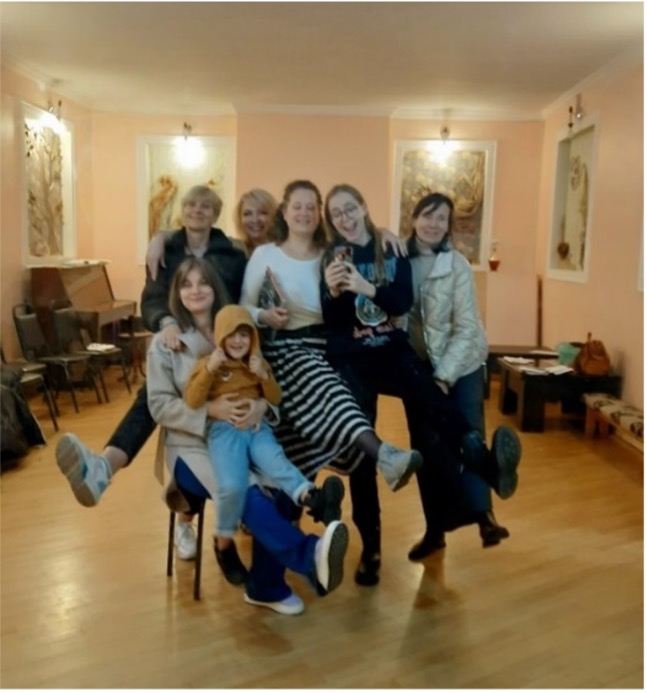
The Problem and Motivation Behind
“When we came to Georgia, we had to figure out what we were going to do next, because the social connections that I had and that many others had in Ukraine, they were disrupted. So, I had to find some way to realise myself professionally.” – Katerina.
Katerina Borislavskaya (27-year-old) is a Ukrainian theatre artist who was forced to flee her home because of the war. She found herself in a new country, feeling disconnected and searching for a sense of purpose. Before the war, she led a vibrant life in the theatre—playing lead roles, touring internationally, and connecting with diverse audiences. But the war changed everything. Almost overnight, she lost her professional networks and social connections in Ukraine.
For Katerina, theatre is more than just a profession—it was a way to heal, especially for those who had experienced displacement and loss. She also believes that theatre could empower people to overcome fear and discover their inner strength. This motivated her to start a theatre workshop to support other Ukrainians, facing similar displacement, to heal, discover themselves, and develop connections among them and their host communities.
The Innovative Solution
“My theatre workshop is about healing one’s soul, revealing oneself, believing in oneself, revealing all of your dreams and making them come true. It is called ‘Teplo’—it means warmth. I want people to feel warmth during our sessions and outside of them. We hear each other. We feel each other” – Katerina.
When Katerina joined the Youth Innovation Lab, she chose to explore the therapeutic use of theatre to help Ukrainian refugees, healing and rebuild their lives in their host communities. Through a Design Thinking process, Katerina began by listening to the needs of children and adults —what they missed, what they feared, what they hoped for. She realized their need for a safe space that allow them to connect, express their grief and emotionally support each other.
Katerina then launched Teplo, a theatre workshop designed to bring Ukrainian refugees together through creativity and expression. The theatre is not composed of professionals but ordinary people— children and adults—who come to explore emotions, rebuild confidence, and reclaim joy through performance. “We started small, but now we have 20 kids and 22 adults. We’ve already toured, performed at two festivals, and built something real.” – Katerina shared.
“When I started doing theatrical classes, I felt I could breathe. And when I breathe, others breathe. So, by healing myself, I also heal others.” – Katerina.
Teplo performances were quite emotional experience for its member and audience. Some audience returned multiple times; others wrote to Katerina days later, saying they finally understood the emotional burden that displacement had on them. Beyond emotional healing, theatrical activities were quite transformative for the group members. Formerly shy individuals now walk confidently onto the stage. Adults and children alike have overcome fears and found their voice. Through theatre, Katerina has created a community that listens, grows, and supports one another. The ripple effects extend beyond her workshop, influencing relationships, confidence, and mental wellbeing.
Lessons Learned and Addressing Challenges
“The training was incredible. Even things I thought I already knew were presented in such a fresh way—it overturned a lot of my perceptions … The mentors really helped me a lot. Even when I couldn’t find a space or didn’t know what to do next—they were there” – Katerina.
The Youth Innovation Lab provided Katerina with a seed grant, training and mentorship support that enabled her to purchase essential equipment and set up her theatre workshop. She learned how to use tools like the Business Model Canvas, and for the first time, started thinking about accounting and project development.
Reflecting on her experience, Katerina identified two major lessons learned:
- Overcoming age-based bias through persistence: One of the first challenges Katerina faced was being underestimated because of her age. Despite her experience and passion for theatre, venue managers and local partners were hesitant to take her seriously. “The first big obstacle was my age. I’m 27, and I look even younger. People don’t expect someone at my age to run a theatre,” she explained. However, she remained focused on her work, and gradually earned the respect of those around her. Once collaborations began, people stopped focusing on her age—because her work spoke for itself.
- Working with the available resources: Another major challenge Katerina faced was a lack of resources. In Georgia, theatre props were difficult to find and expensive to produce. Without access to ready-made materials, she and her team often stayed up late crafting decorations by hand. Rather than waiting for perfect conditions, she made the most of what was available.
Next Steps and Future Aspirations
“My next step is more performances—new plays with children and adults. We want to tour more, perform more, and reach more hearts.”
Katerina dreams of expanding Teplo into a permanent cultural space for Ukrainians and other displaced communities in Georgia. Her vision includes not only regular performances but workshops, masterclasses, and collaborative projects with Georgian artists. She hopes to secure a permanent space, overcome the resource constraints, and build long-term sustainability.